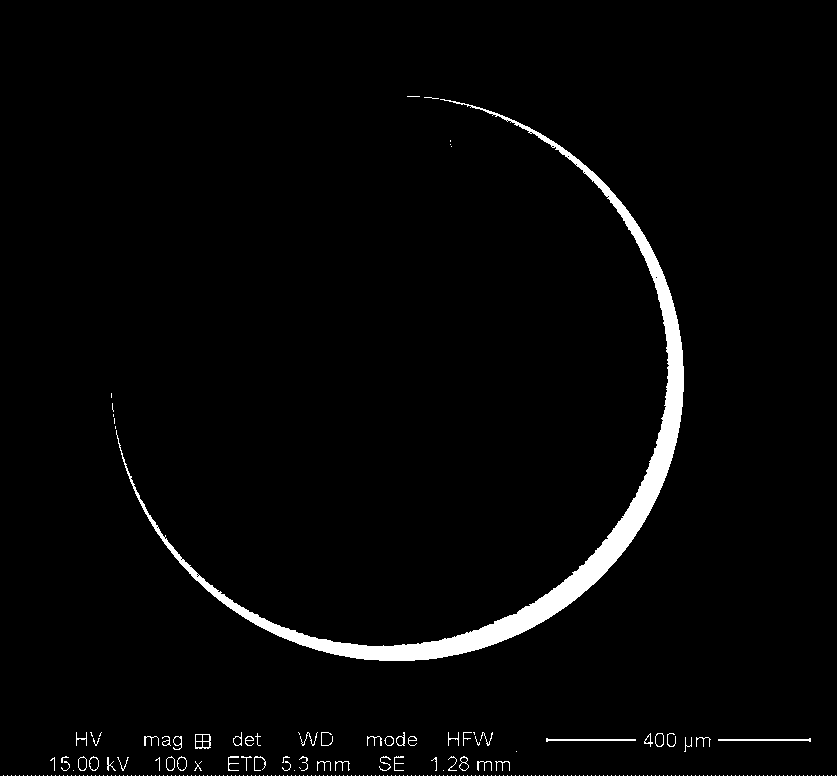Preparing method for hydrocarbon polymer hollow microspheres
A hydrocarbon polymer and hollow microsphere technology, which is applied in the field of laser inertial confinement fusion materials preparation, can solve problems such as difficult to meet the requirements, and achieve the effects of controllable wall thickness, easy research, good concentricity and uniformity of wall thickness
- Summary
- Abstract
- Description
- Claims
- Application Information
AI Technical Summary
Problems solved by technology
Method used
Image
Examples
Embodiment 1
[0017] Preparation of Hydrocarbon Polymer Hollow Microspheres
[0018] Step 1. Select a poly-α-methylstyrene mandrel with a diameter range of 1000 μm±50 μm, and place the microspheres in the sample tray of the device.
[0019] Step 2. Close the device and vacuum to 1.0×10 -3 Pa, and then feed a mixed gas of 0.4 sccm of trans-dibutene and 10 sccm of hydrogen, and adjust the internal pressure of the device to 10 Pa.
[0020] Step 3. Turn on the 40.68MHz RF power supply and adjust it to 15W to ionize the working gas to form plasma.
[0021] Step 4, start the vacuum motor to drive the poly-α-methylstyrene mandrel to roll in the sample tray, so that the glow discharge hydrocarbon polymer is deposited on the surface of the microsphere for 200 hours.
[0022] Step 5. Heat the product prepared in step 4 to 300°C under a nitrogen atmosphere, and keep the temperature for 24 hours to remove the poly-α-methylstyrene mandrel in the inner layer. After cooling to room temperature, a diamet...
Embodiment 2
[0025] Preparation of Hydrocarbon Polymer Hollow Microspheres
[0026] Step 1. Select a poly-α-methylstyrene mandrel with a diameter range of 500 μm±20 μm, and place the microspheres in the sample tray of the device.
[0027] Step 2. Close the device and vacuum to 1.0×10 -3 Pa, and then feed a mixed gas of 0.6 sccm of trans-dibutene and 10 sccm of hydrogen, and adjust the pressure in the device to 15 Pa.
[0028] Step 3. Turn on the 40.68MHz RF power supply and adjust it to 20W to ionize the working gas to form plasma.
[0029] Step 4, start the vacuum motor to drive the poly-α-methylstyrene mandrel to roll in the sample tray, so that the glow discharge hydrocarbon polymer is deposited on the surface of the microsphere for 20 hours.
[0030] Step 5. Heat the product prepared in step 4 to 300°C under a nitrogen atmosphere, and keep the temperature for 24 hours to remove the poly-α-methylstyrene mandrel in the inner layer. After cooling to room temperature, a diameter of 500 μ...
Embodiment 3
[0032] Preparation of Hydrocarbon Polymer Hollow Microspheres
[0033] Step 1. Select a poly-α-methylstyrene mandrel with a diameter range of 1500 μm±50 μm, and place the microspheres in the sample tray of the device.
[0034] Step 2. Close the device and vacuum to 1.0×10 -3 Pa, and then feed a mixed gas of 0.2 sccm of trans-dibutene, 10 sccm of hydrogen and 0.1 sccm of tetramethylgermanium, and adjust the internal pressure of the device to 20 Pa.
[0035] Step 3. Turn on the 40.68MHz RF power supply and adjust it to 25W to ionize the working gas to form plasma.
[0036] Step 4, start the vacuum motor to drive the poly-α-methylstyrene mandrel to roll in the sample tray, so that the glow discharge hydrocarbon polymer is deposited on the surface of the microsphere for 10 hours.
[0037] Step 5. Heat the product prepared in step 4 to 300°C under a nitrogen atmosphere, and maintain the temperature for 24 hours to remove the poly-α-methylstyrene mandrel in the inner layer. After ...
PUM
| Property | Measurement | Unit |
|---|---|---|
| diameter | aaaaa | aaaaa |
| diameter | aaaaa | aaaaa |
| diameter | aaaaa | aaaaa |
Abstract
Description
Claims
Application Information
 Login to View More
Login to View More - R&D
- Intellectual Property
- Life Sciences
- Materials
- Tech Scout
- Unparalleled Data Quality
- Higher Quality Content
- 60% Fewer Hallucinations
Browse by: Latest US Patents, China's latest patents, Technical Efficacy Thesaurus, Application Domain, Technology Topic, Popular Technical Reports.
© 2025 PatSnap. All rights reserved.Legal|Privacy policy|Modern Slavery Act Transparency Statement|Sitemap|About US| Contact US: help@patsnap.com

